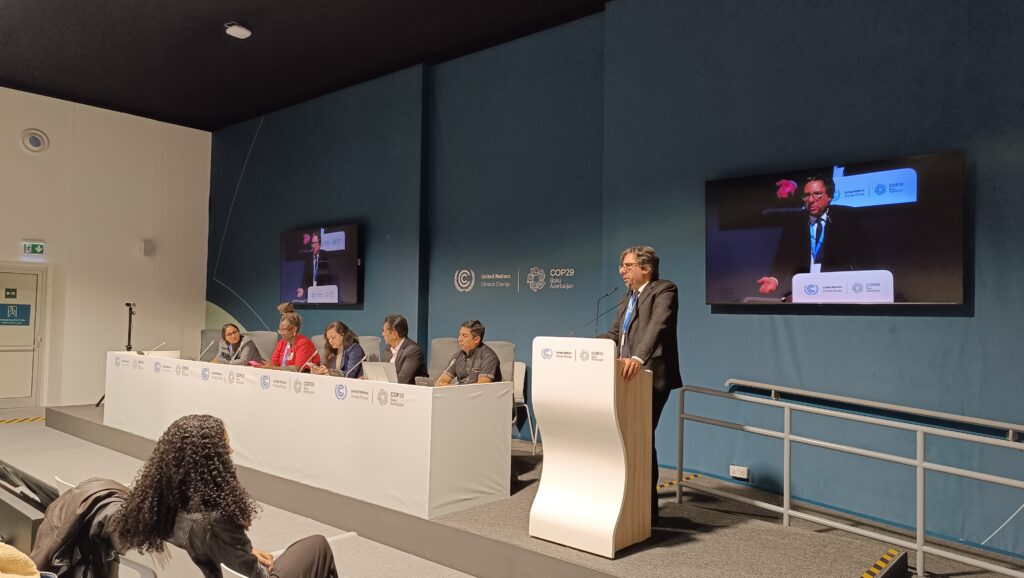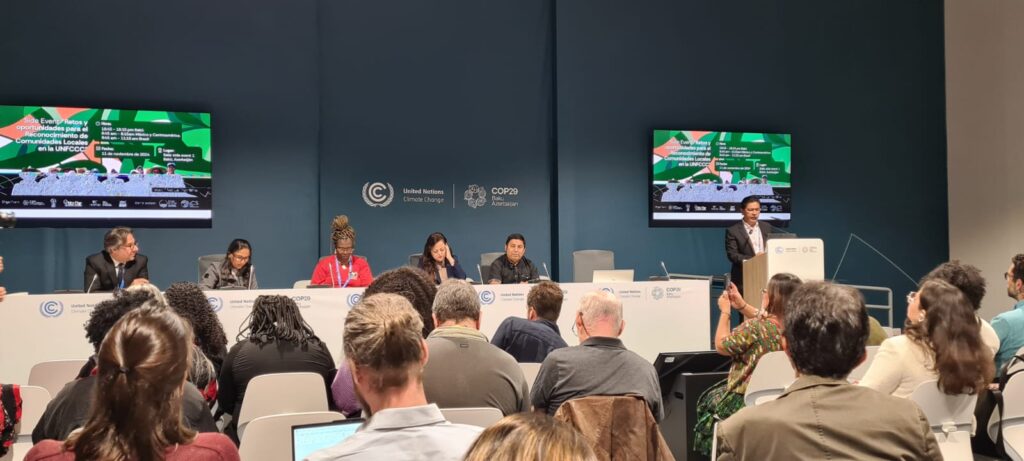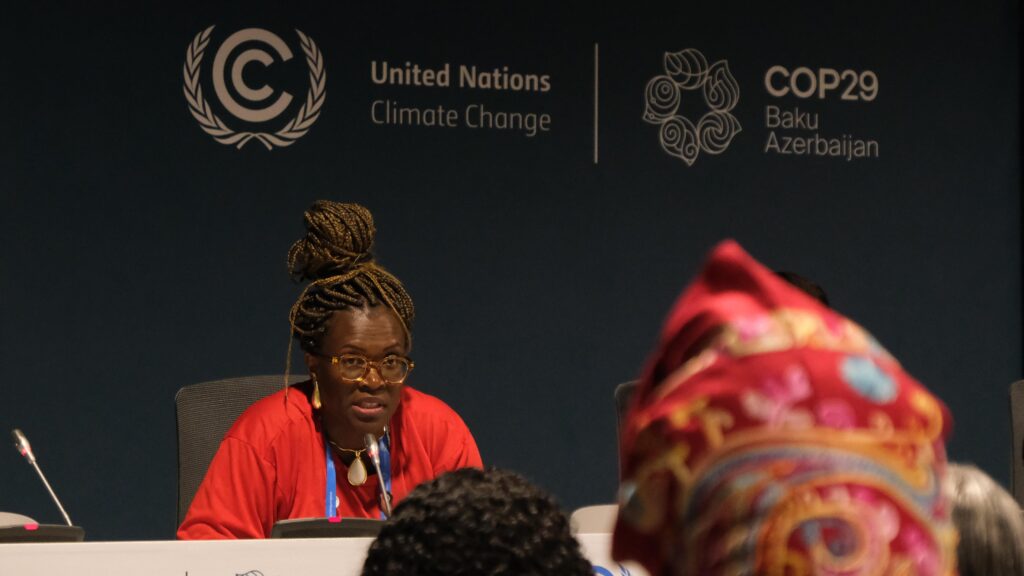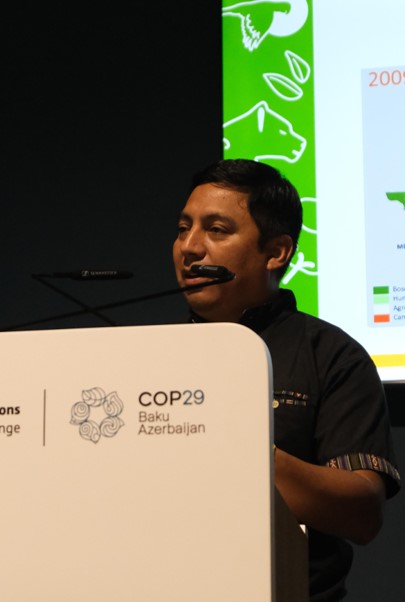Brazil says it is determined to act for the recognition of local communities in the Convention on Climate
On the first day of the COP29, the side event discussed the rights of local communities, in the hope that this group can achieve a voice and space to the COP30, in beth-lehem.
By Andreas Fanzeres/OPAN

Baku, Azerbaijan, in Cuiaba, Brazil, On the first day of the COP29, the Brazilian government is committed to take all measures necessary in order to recognize the communities in the Climate Convention. It was during the side-event on “the Challenges and opportunities for the recognition of local communities, and to the UNFCCC”, organized by the Mexican Network of Farmers ‘ Organizations the Forest (the Red Mocaf), and the Operation in the Amazon’s Native (OPAN), with the support of the Institute for Climate and Society (cis), the Alliance Mesoamerican Peoples and Forests (AMPB), a partnership of the Forestry Community in Guatemala Utz Che and the Forum in Popular social and Environmental-of-state of Mato Grosso (From).
The government of brazil, there is a gap in the implementation of the rights of the local communities in the Convention of the United Nations Framework on Climate Change (UNFCCC). “This is a very well-characterized, the importance of and the need for a space for local communities, it was already something that treaty and Agenda 21, the Rio ‘ 92, it is also in the text of the convention [Convenção da Diversidade Biológica] and the conditions of the weather, first of all by the decisions of the COP, the Agreement in Paris, and on the Platform [de Comunidades Locais e Povos Indígenas – LCIPP] a few years ago. The whole of the land is prepared for it, but then realize that their participation. We, as the federal government of brazil and the future of the presidency of the COP, and we look forward to it, and we think this is supposed to happen,” said Marco Túlio Cabral, of the Department of Climate and Environment and the Ministry of Foreign affairs.
In a different context, of brazil, and the recognition of local communities in international agreements of the company in Mexico, which define the way that indigenous peoples and local communities must be addressed in a number of projects for Reducing Emissions from Deforestation and forest Degradation (REDD+), as they have had a positive impact for the community’s different from the native people, who are managing the territories, as it reminded him of Gustavo Sánchez, the president of the Red Mocaf.

According to him, the term ‘local community’ has also been important in order to protect our communities and ethnicities native to the oppressed in a country that does not recognise the indigenous people. For the Pagination, which repeatedly have been looking at the last two editions of the COPs to raise awareness of governments, and members of the LCIPP the mechanisms of their full and effective participation in the agency’s constituent Convention, during the years, several non-governmental organizations, academics, and representatives of communities that have developed a proposal that is based on these four criteria for the recognition and autorreconhecimento of the local community. The first requirement is that these groups, which bring together the history and culture of the ordinary. Their components that are also recognized by their local communities, to have a relationship with the land, that it may be the collective, and the engine itself, and governance and representation. “Four of these criteria may be useful as a starting point for the implementation of an agreement in these areas”, says again.
So She Dealdina Mbaye, executive secretary of the National coordinator of the Articulation of the Black community in Rural Quilombo (Conaq), with the participation of local communities and traditional at the UNFCCC, it is a matter for the repair history. “The people are considered to be the traditional communities in Brazil to have a connection with the ancestors, the earth, ‘t know how to deal with the space. A farmer in Brazil, it is not the people in the traditional sense. Some countries may have difficulty in understanding. This is the discussion needs to go to the UNFCCC, and it needs to be understood,” he said. She explained that there is a 28-year Conaq the fight for the title of the quilombola territories for more than one of the 1.5 million people who are autodeclaram maroon, with with more than 7 thousand of the slaves, in 24 states in the country. “In the title needs to be done because people are dying, they are being carried out, for they fight for their land”.

In that sense, Portugal’s foreign ministry, pointed out that there are vulnerabilities that are specific to the local communities in the context of climate adaptation for sustaining economic disadvantages, discrimination, and the impact of the direct or in rural areas. “These communities have a lot to contribute to the fight against climate change, because they occupy the territories that are important from various points of view, including that of stocks and carbon sinks, forests are important for biodiversity, and so all of those are very good reasons for it, this theme is the subject matter of the action in a specific way. As the presidency of the COP, we look forward to working to make this a reality.” No, the Conaq, he added, that, without any of the traditional communities, and protecting the habitats, such as the Pantanal, the Pampas and the Cerrado, there will be no protection from Amazon.
COP30
The expectation that the COP30 there is, in fact, a decision is overwhelming, with respect to the recognition of local communities in the Convention of the Climate is expected to come in the middle of a large joint, popular, about which the organisation told Cleidiane Vieira, a Movement of those Affected by Dams (MAB), and it is a part of the Operating of the National People’s Summit, heading for the COP30. “I’m in Bethlehem so long now, I welcome to all of you. We are in the year of the COP, with a lot of expectations. The challenge is that the convergence of interests and diverse, involving multiple people, so that we can move forward on the agenda to improve the living conditions of our people in order to continue to protect and living in their respective territories.”
So, it is time for Brazil to take over his role. “The fight for climate action needs to take a leap of organizing the world and you might just have to start all over Brazil. It’s important to COP in the democratic countries of the world in order to improve our standards. Bethlehem is a large room, we want the people of the country and the world to have a voice, and a time,” he said Cleidiane of the AREA. “We expect all of you to build up to a COP of democratic quality. ‘I don’t know COP30 is going to mark out the before and the after,” adds She, on the Conaq.
Well Marycruz Villegas Rivas, who was the representative of the deputy prime minister of Natural Resources and Climate Change, Ministry of Environment and Natural Resources of Guatemala, presented his country as an ally in the negotiations on climate change in defense of the recognition of the local community. “One of the most important aspects of the local communities to have a voice and a space, that is, the strengthening of the governance of the institution. Do we really want the local community to have a voice and vote in international business. Important to empower the local bodies to enable them to be part of the delegation, follow up with the face key issues are addressed,” he stressed, citing the ever-increasing presence of the representatives of the local communities in the construction of public policies, and in the coordination of international stays.
Selvyn Perez, a representative of the Association Utz Che of Guatemala, as well as the treasurer of the Board of directors of the Alliance of Mesoamerican Peoples and Forests (AMPB), has issued a call for you, in this discussion, there will be particular in solidarity with them. “This is one of the basic principles. They believe that local communities are able to compete for funding, and that it is not true. The answer to that is coming up it is important that we do more of the sharing of experiences, in terms of the dialogue, and it is important that the dialogue on the concept of the local community, breaking paradigms and visions of disasters, such as those who do not believe they can afford to sign in to the system, because it might violate the rights, or you can pipe and stealing their resources, called Pharez.

To remind you of the recent recognition of people of african descent in the city of Cali, in the CBD, She, on the Conaq, while your frustration of not seeing the quorum, as between the Parties, when the discussion was a review of the funding. Sanchez, a Red Mocaf, they also pointed out the challenges of this schedule, the impact is not only in the UNFCCC, but in other places worldwide, in the quest to carry out important dialogue. “It’s not easy to keep the incidence of simultaneous carrying out at the same time, our agenda in the region.
“We are hoping that this event has served to clarify to those that are in the local communities, their importance, and the recognition of their rights to take away the right of anyone, on the contrary, the more the community will have their rights recognized, the more secure they become in their territories, ended Sanchez’s Red Mocaf.
According to Cabral, the form of processes, such as the inclusion of the subject in a new decision, the COP, or if you just administrative tasks with the secretariat of the UNFCCC, in the case of the participation of the local communities on the Platform of the Local Communities and Indigenous Peoples (LCIPP), which currently has seven members from the government, and the seven members of the indigenous population. “We are committed to doing what is necessary, and we will,” said the chief negotiator of brazil.
For a review of the side-event on the go with the Youtube OPAN , and on the cover of the first day of the COP29 is made by the communication team of the Instituto Centro de Vida (ICV).
